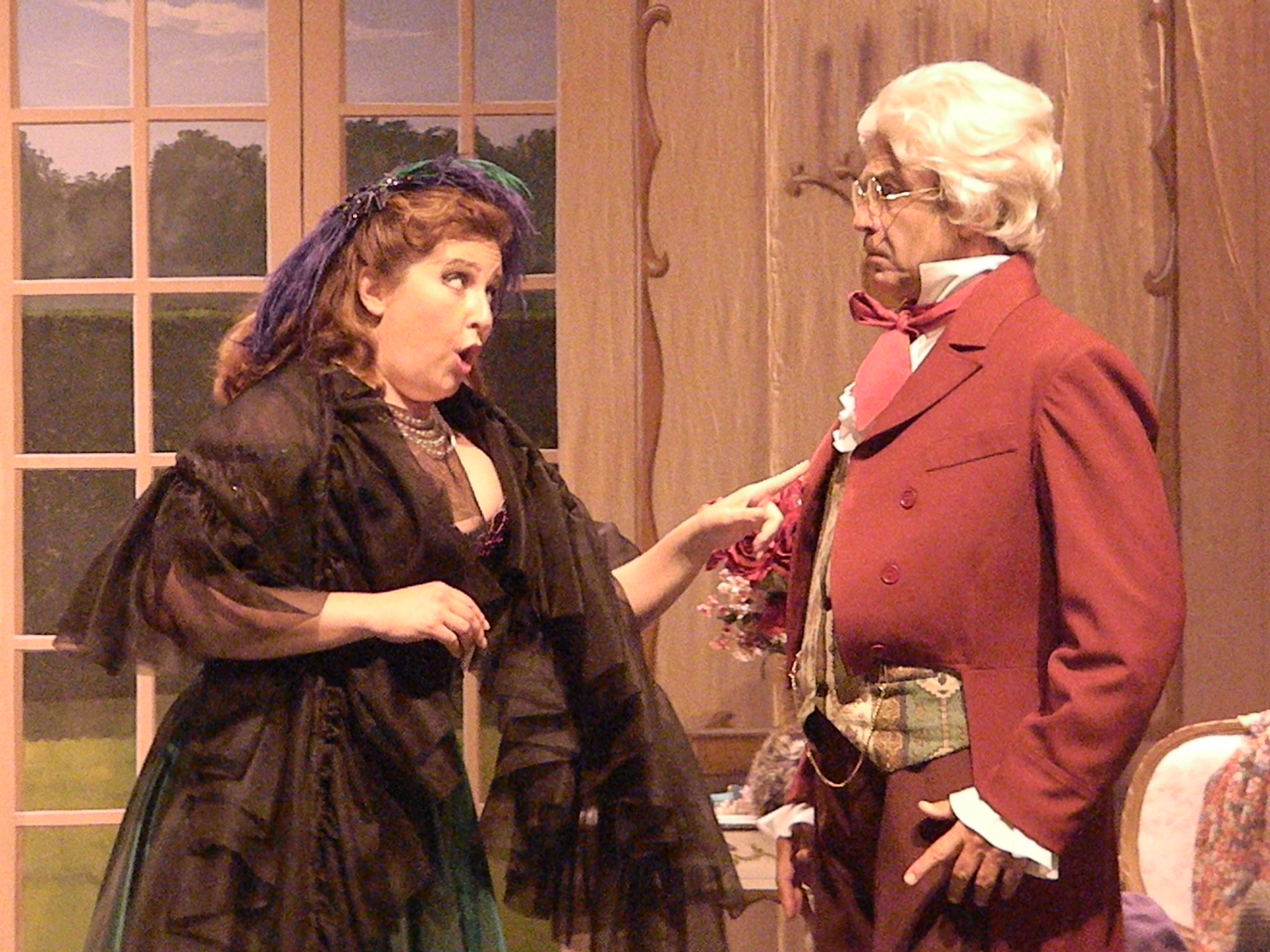Bass and soprano deliver the highlights in Miami Lyric Opera’s “Don Pasquale”

Gina Galati and Stefano de Peppo in Miami Lyric Opera’s production of “Don Pasquale.” Photo: Maria Menendez.
Miami Lyric Opera’s production of Don Pasquale opened Saturday night at Miami Beach’s Colony Theater. While the staging showed moments of promise, the overall results were mixed, lying somewhere between a community and professional production.
Don Pasquale is Gaetano Donizetti’s enduring masterpiece. Although the Romantic period was well underway by its 1843 premiere, Don Pasquale recalls the height of Classical Italian comic opera. Written in the bel canto, or fine-singing style, the opera buffa resurrects the charm and clarity of the late 18th century style.
Mozart fans will find familiar themes here: whistle-able melodies; soap opera deception; a selfish aristocrat; and the inevitable triumph of young love, in a garden no less. With a compact cast of four, the action should be easily followed, but only two of the roles were fully realized Saturday night.
Italian bass Stefano de Peppo, as the aged bachelor Don Pasquale, and soprano Gina Galati, as Norina, a beautiful widow that Pasquale will not allow his nephew to marry, are each delightful, eliciting laughs and sympathy.
From the opening, de Peppo’s bass lifts the company’s production values into the professional range. Terrifically consistent across all ranges, de Peppo’s excellent diction and powerful projection combine with a meticulous, broadly comic performance that anchored the evening.
As Norina, Galati’s opening recitative was rough, but when supported by the orchestra, her aria “So anch’io la virtù magica” revealed her flexible but powerful lyric soprano and good intonation.
By Act II, Galati was in the zone both dramatically and vocally, first as “Sofronia”, a trembling girl of sweetness and light, complemented by de Peppo’s secure voice and detailed comic timing. After they marry, Sofronia’s sudden turn for the much, much worse is joined by Ernesto and Malatesta in a triumphant quartet, featuring nicely matched, soaring duos between Galati and David Pereira as Ernesto.
As Pasquale’s pining nephew, David Pereira displayed a nearly ideal tenor voice with Ernesto’s introductory aria “Sogno soave e casto.” Yet his one-dimensional, scowling portrayal was less effective. Although Pereira’s singing has the potential to melt the heart, he tends to plant himself stiffly and sing to the back wall, ceiling or floor. A little eye contact would establish a much more likable character.
Daniel Snodgrass was Doctor Malatesta, the puppetmaster determined to exact revenge against Pasquale’s tyranny and bring the two lovers together. Snodgrass’ agile baritone meshes well with de Peppo’s, but lacks the latter’s force, often swallowed by the winds. With the first of many enchanting arias in the opera, “Bella siccome un angelo,” Snodgrass’ Malatesta is understated, wide-eyed, and beneficent rather than Machiavellian. His beaming smile is too pleasant, lacking any mischievous spark that would guide the audience’s understanding of the conceit better.
Act III belonged to de Peppo, hilarious as he bemoaned his fate. The pinnacle of the opera was the two leads’ extended scene, with Don Pasquale’s lament “E’ finita” underpinned by Galati’s tender, concealed remorse for her part in the deception in “É duretta, la lezione.” However, in the second scene, the ageist moral simply doesn’t ring true, partly because we are still wondering about how we arrived there.
For better and worse, several choruses take place in Act III. While the solo singing is strong, and well staged, the choruses were too often choreographed like a high school concert. The final offstage chorus was simply disastrous, using an electric keyboard accompaniment, and with nonexistent coordination between the musicians. Pereira’s vocal beauty from offstage only underlined his need for more animation onstage.
Still, the earnest Miami Lyric Opera is doing many things right. Foremost among them was casting de Peppo, and distinctive voices for the remaining leads. Despite artistic director Raffaele Cardone’s pre-show warning not to expect too much from the sets, the trompe l’oeil scrims were perfectly serviceable and the costumes fun.
Economic factors clearly limit MLO’s ability to achieve their full potential. A few more string players on each part of the 22-musician orchestra would immediately bring much-needed blend to the winds and brass and smooth out rough-edged intonation. Conductor Leo Walz does an efficient job, but a few dollars would provide drastic improvement.
Miami is large enough to support both a large and alternative opera company. Hopefully, MLO’s support will broaden enough to let the company show what they are really capable of doing.
Don Pasquale will be repeated 4 p.m. Sunday at the Colony Theater. http://miamilyricopera.org/tickets-2
Posted in Performances
3 Responses to “Bass and soprano deliver the highlights in Miami Lyric Opera’s “Don Pasquale””
Leave a Comment
Sun Jun 29, 2014
at 1:41 pm
3 Comments







Posted Jun 29, 2014 at 5:42 pm by Dede Bacro
I have heard Stefano de Peppo sing at the Sarasota opera, and he is indeed a seasoned professional, with a beautiful blend of both vocal and acting capabilities… I am not surprised that he excelled in this production…
Posted Jun 29, 2014 at 6:10 pm by Shahab Ispahani
I enjoyed reading this review. My own experience of hearing and seeing the talented Stefano de Peppo elsewhere was accurately reflected in Dorothy Hindman’s observations of his vocal and acting talents…that made this review credible.
Posted Jun 30, 2014 at 1:35 pm by Stefano de Peppo
Thank you VERY much for this lovely reviews, Ms Dorothy Hindman!